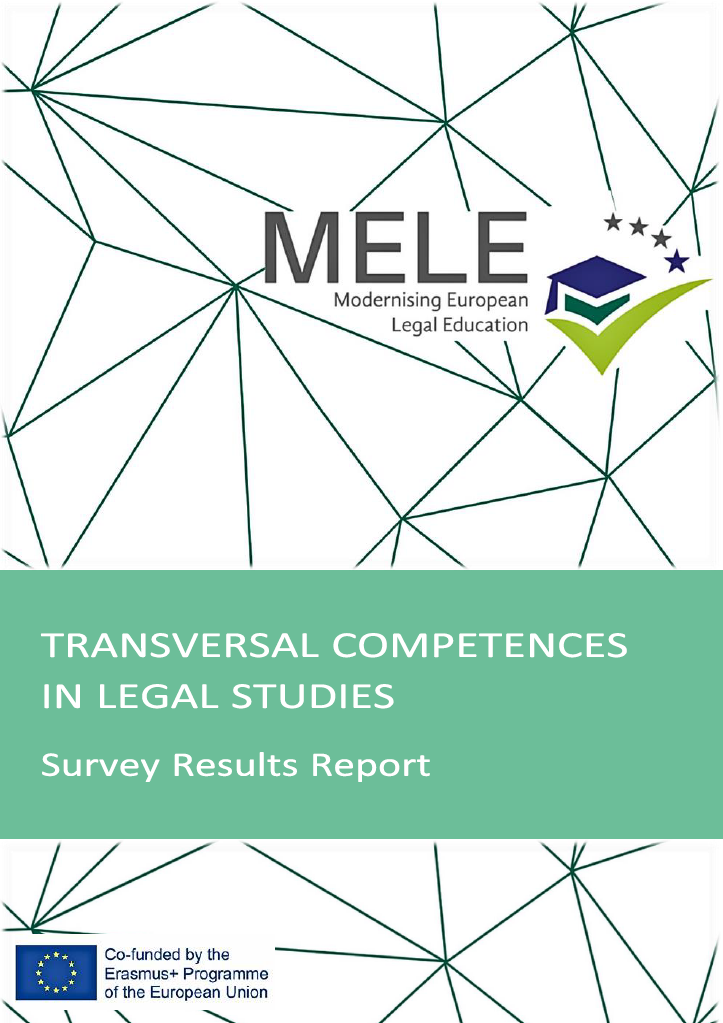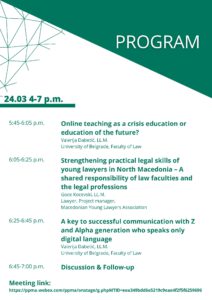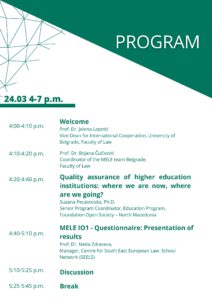Survey
Survey
on Transversal Competences in Legal studies
Transversal Competences in Legal Studies
Survey resulTs Report
Here you can find the final report on the results of the comprehensive survey implemented as Intellectual Output 1 in the MELE project:
MPE IO1: SURVEY BELGRADE (ONLINE) – FOLLOW UP REPORT
Due to the high numbers of Covid cases and travel restrictions, the first multiplier event (MPE1) on “Transversal Competences in Legal Studies” took place online on 24 March 2022 from 4 p.m. to 7 p.m., hosted by our partner University of Belgrade, Faculty of Law. In this meeting the results of the Intellectual Output 1 (IO1), which where the Key Skills of the Survey, who were finalized in a draft version, were presented, and discussed. However, through highly relevant presentations by the invited speakers, as well as the ensuing discussions, the event also served as an excellent opportunity to receive important feedback on the various issues of concern for other IO´s to assist in further developing the contours and contents for future research activities within the MELE project. A total of 69 participants attended the MPE1, among which 32 were local participants coming from various institutions in the Republic of Serbia and 37 foreign participants. The MPE1 was officially opened by Prof. Dr. Jelena Lepetić, Vice-Dean for international cooperation of the University of Belgrade Faculty of Law, who greeted the participants and used the occasion to stress the importance of the MELE project for the Faculty, its staff and students. Participants were further welcomed by Prof. Dr. Bojana Čučković, coordinator of the Belgrade Faculty of Law project team. She introduced the consortium and the project to external participants, as well as to participants coming from partner institutions. To set the pace of the event Prof. Čučković questioned whether education and teaching methods that are used in the field of legal studies are still able to meet the ever-changing needs of the legal profession in its various aspects.
This was followed by a key note lecture on “Quality assurance of higher education institutions: where we are now, where are we going?”, by Prof. Suzana Pecakovska, Senior Program Coordinator of the Education Program of the Foundation Open Society – Macedonia. The key note lecture fitted perfectly into the aims of the MPE1 since all the activities that are and will be conducted within the MELE project aim at assuring and enhancing the quality of legal studies and legal education. The first part of the MPE1 was finalized by the presentation of results achieved within the MELE IO1 – the Questionnaire. Prof. Neda Zdraveva from the MELE project team, full Professor of Civil Law at the Iustinianus Primus Faculty of Law and Secretary General of the South East European Law School Network, presented the main conclusions reached after data gathered through questionnaires at respective partner institutions were meticulously analysed. A following discussion pointed out the need to use the results of the Survey to reflect on additional ways in which the benefits of the interactive and practical teaching methods could be employed to enhance the practical skills of students and to prepare them properly for future legal professions not necessarily limited to classical ones. The second part of the MPE1 commenced with a presentation on online education as a dominant learning approach during the Covid-19 pandemic with the title: “Online teaching as a crisis education or education of the future?”, prepared by Valerija Dabetić, teaching assistant at the University of Belgrade, Faculty of Law. Afterwards, Mr. Goce Kocevski, program director at the Macedonian Young Lawyers Association and PhD student in Constitutional Law presented the topic “Strengthening practical legal skills of young lawyers in North Macedonia – A shared responsibility of law faculties and the legal professions”. The last part of the MPE1 was delivered by Valerija Dabetić with the second part of her presentation entitled “A key to successful communication with Z and Alpha generation who speaks only digital language”.

MPE 1 on 24th March 2022 (online)
The MPE 1 to present the results of the surveys will be hosted by our partner the University of Belgrade, Faculty of Law and will be held once again online due to the pandemic.
The event will take place on 24th March 2022 from 16:00pm to 19:00pm. Participation is free of charge and all those who are interested are invited to attend. Below you will find the program and the link to the event:



Meeting Link: Link to the MPE 1
Program Download: MELE_MPE1_Invitation_Belgrade_final
PRELIMINARY RESULTS AVAILABLE NOW!
The preliminary project results can be found here: IO1 report
The final version is expected to be published here in March 2022 and presented at MPE 1.
Further information will follow.
GENERAL INFORMATION ABOUT THE IO1: SURVEY – TRANSVERSAL COMPETENCES IN LEGAL STUDIES
The Intellectual Output “Survey on Transversal competences in Legal studies” will be developed and supervised by the South East European Law School Network (SEELS). The survey is intended to investigate the consideration of transversal competences in legal studies. It is supposed to help preparing the Intellectual Output 3 “Method tool box” and the results will be incorporated into its design. In order to be able to work in a well-founded way and to be able to respond to the actual needs of the teaching staff, this detailed survey of the young academic staff and professors will be carried out in advance. The need to modernise the teaching of law has already been described above and the needs assessment has shown that there is either little and old (Germany, UK, Spain, Netherlands) or none (South Eastern Europe, Serbia, North Macedonia and Croatia) data available concerning transversal competences in legal education. Without these data it is almost impossible to develop successfully the method tool box, especially when it comes to the possibilities of integrating transversal competences into teaching and which support should be available to ensure that such integration actually takes place.
Therefore, the questionnaire will be structured in such a way that it will provide these usable results. It will ask for the consideration of the various competences (problem-solving skills, profound communication skills, the ability to work independently on new topics and to continue and discuss current problems and social issues of the present as well as critical thinking) in legal education, the teaching methods used, the age range of teaching staff, the level of students and the general field of law (criminal, public or private law). The survey is conducted anonymously and electronically.
This survey is innovative in two respects: 1) On the one hand, because academic staff, distinguished by level of experience, in particular are to be surveyed, i.e. the focus is on young academics that usually do not have a large say in new developments in teaching and research and is less listened to than established professors. 2) On the other hand, such large, supra-regional and international surveys on ways of innovating legal education are hardly ever carried out and, if so, then only at the national level. This circumstances, however, stands in the way of the Bologna Process, which aims to achieve the highest possible comparability of European higher education. In addition to the survey itself, the consortium partners will also be provided with a methodological introduction to the survey. This will also be prepared by SEELS, which has expertise in this field and has already conducted several surveys among its member faculties on teaching and research in legal studies. SEELS will also be responsible for the evaluation and preparation of the feedback and results. Subsequently, only the analysis of the results will be made available to the public. For reasons of data protection and in order to reduce obstacles to participation, the individual responses will remain internal and anonymous. It is expected that the results of the survey enables the consortium to work on the different handouts and samples for the method tool box. Moreover, the results should also serve as a discussion basis for each consortium partner to rethink their own way of teaching and training in a broader context.
Note: The two partners, University of Groningen and Regent´s University will not be part of the Survey, since they do not offer traditional legal studies which would cause problems in the conducting of the survey and distort the results.
